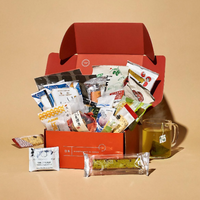Tea With a Twist: Kombucha’s Journey Through Japan
What Is Kombucha? A Breakdown of the Tea Mushroom Drink

Kombucha, also known as a "tea mushroom," is a refreshing and tangy fermented tea beverage that has taken the wellness world by storm for its distinctive flavor and probiotic qualities. Created by fermenting sweetened black or green tea with a SCOBY (Symbiotic Culture of Bacteria and Yeast), kombucha strikes a balance between sweetness and acidity. During fermentation, the bacteria and yeast convert the tea's sugars into a naturally fizzy, slightly sour drink rich in beneficial probiotics. With its complex flavor and potential health perks, kombucha has become a staple among fermented drinks, offering a delicious and revitalizing way to support wellness.
Where Did Kombucha Originate? A Look at Its Global Roots

Kombucha's origins are wrapped in legend and ancient history, with many accounts pointing to its roots in East Asia. One of the most widely accepted theories suggests that kombucha consumption began during China's Qin Dynasty (around 221 BCE), where it was esteemed for its supposed healing powers and ability to promote longevity. Ancient Chinese folklore even dubbed it "the tea of immortality." The name "kombucha" is thought to derive from the Chinese term hongchajun, which translates to "red tea mushroom" or "red tea fungus," referring to the tea’s unique SCOBY that resembles a mushroom-like growth. Other theories suggest that the drink may have originated in Korea or the Manchuria region, where both tea and fermentation practices were prevalent.
The kombucha spread from East Asia to Japan before making its way westward, becoming especially popular in Russia by the early 20th century. In Russia and parts of Eastern Europe, it became widely consumed and was often referred to as "tea kvass." Interest in kombucha surged again in the West, driven by rising awareness of gut health, the HIV/AIDS epidemic, and a broader fascination with probiotics. Today, kombucha is enjoyed across the globe, with its rich history and health benefits continuing to attract those looking for a healthy drink.
Kombucha vs. Konbucha: A Japanese Mix-Up Explained

Despite their similar names, kombucha and konbucha are entirely different beverages with distinct origins and ingredients in Japan. Kombucha, the fermented tea made with sweetened tea leaves and a SCOBY (Symbiotic Culture of Bacteria and Yeast), is a tangy, effervescent drink that originated in East Asia and is celebrated for its probiotic benefits. Though natural fermentation, kombucha tea is transformed into a bubbly, slightly acidic drink rich in health benefits.
On the other hand, "konbucha" in Japan actually refers to a completely different beverage: kelp tea made from kombu, a type of edible seaweed steeped in hot water. This savory, umami-rich drink is not fermented and is prized for its soothing qualities and high mineral content. Often flavored with salt or pickled plum (umeboshi), konbucha is especially popular during colder seasons as a warming, healthy tonic. Unlike the sweet and tangy fermented kombucha, konbucha has a subtle, oceanic flavor and contains no tea leaves or probiotics. Due to their similar names but vastly different characteristics, it's important to understand the distinction, as ordering "kombucha" in Japan could lead to an unexpected but unique experience.
The Rise of Kombucha in Modern Japan

In recent years, kombucha has seen a significant rise in popularity in Japan, especially among health-conscious consumers drawn to its health benefits. A key figure in its rise is Oizumi Kojo, who, after discovering authentic kombucha abroad, opened Japan's first full-scale kombucha brewery, Kombucha Ship, in 2019. His mission to introduce this functional beverage has sparked a surge in kombucha sales, with his brewery now offering a variety of flavors made from organic teas and local ingredients. These kombuchas are available on tap at over 40 locations, including Oizumi's bars in Nishi Azabu and Omotesando, with flavors like yuzu, shiso, and mulberry leaf. As interest grows, kombucha's benefits continue to resonate with Japanese consumers, promising a bright future for the drink.
Health Benefits of Kombucha: Why People Drink It

Kombucha is known for its potential health benefits, especially when it comes to supporting the digestive system. As a fermented beverage, it contains live beneficial bacteria that support a healthy gut microbiome. Drinking kombucha regularly can aid in improving digestion by encouraging the growth of good gut flora, which can help reduce bloating, improve nutrient absorption, and ease constipation. Additionally, organic acids like acetic and glucuronic aids, produced during fermentation, may aid in detoxification and support overall digestive function, contributing to overall health and reduced inflammation.
Kombucha's potential to boost immune system is another reason many are choosing it over soft drinks. Rich in probiotics and antioxidants, it may help strengthen immune responses and even support heart health by potentially lowering cholesterol. Its combination of organic acids and nutrients could also contribute in disease control, lowering the risk of chronic conditions like high blood pressure and cardiovascular disease. As a flavorful, low-sugar alternative to sodas, kombucha supports digestive health, immunity, and overall well-being, making it a valuable addition to a balanced lifestyle.
How Kombucha Is Made: Fermentation and the SCOBY

Kombucha is created through a fascinating fermentation process that transforms sweet tea into a tangy, fizzy beverage. It starts with brewing tea and dissolving sugar to form a sweet base. Once cooled, this tea is combined with a SCOBY (Symbiotic Culture of Bacteria and Yeast), which ferments the sugars, producing probiotics, organic acids, and a small amount of alcohol content as a natural byproduct. Fermentation can las anywhere from several days to a couple of weeks, depending on the preferred flavor and carbonation. The alcohol levels typically remain under 0.5% in commercial products but may be slightly higher in homebrews. The duration of fermentation and choice of tea are key to shaping the final taste, acidity, and bubbly texture, making each batch distinct.
Japanese-Inspired Kombucha Flavors to Try

As kombucha continues to gain momentum around the world, Japan is adding its own flavorful stamp on the fizzy fermented tea trend. While black tea is commonly used as a base, Japan's kombucha brewers often explore alternatives like green tea, oolong, and herbal varieties, which offer unique flavors and additional health benefits. Japanese kombucha makers are also incorporating local ingredients into modern flavors that are both inventive and culturally significant. For example, yuzu, a fragrant Japanese citrus, adds a zesty tang that complements the natural tartness of fermented tea. Shiso, a minty and mildly spicy herb, brings an earthy, slightly peppery flavor, while ume (Japanese plum) offers a delicate balance of sweetness and sourness, often linked to its digestive health benefits. Other popular ingredients include matcha, with its earthy richness and antioxidant properties, and sakura (cherry blossom), which imparts subtle floral notes. These creative flavors highlight Japan’s innovative approach to kombucha, turning it into a true reflection of the country’s rich culinary traditions.
Where to Find Kombucha in Japan: Cafés and Shops

For those looking to explore the growing world of kombucha in Japan, there are plenty of exciting options to discover —from health-focused cafés and kombucha tap bars to specialty online shops and select supermarkets. As the demand for bottled kombucha and fermented beverages grows, cities like Tokyo, Kyoto, and Osaka are becoming hubs for kombucha lovers.
Here are some popular kombucha brands, bars, and cafes in Japan:
-
Kombucha Ship (Brand): Japan’s largest kombucha producer, Kombucha Ship offers unbottled kombucha served fresh on tap. Distirbuted to restaurants, cafes, and bars around Japan.
-
Wow Kombucha (Brand): A colorful line of bottled kombucha available in bright, fruity flavors such as ginger & lime, pomegranate & apple, and mixed berry. Often found in natural food stores and online.
-
Culture & Leaf: Japan’s first RTD (ready-to-drink) kombucha brand. Available in bottled form, it comes in calming and aromatic flavors like lavender chamomile, ginger cinnamon, and peppermint.
-
Elle Café (Aoyama, Tokyo): A chic health and wellness café operated by Elle Magazine. Known for its stylish ambiance and flavorful kombucha options like pomegranate & berry, passionfruit & ginger, and lychee & rose.
-
Oizumi Kojo Nishiazabu (Tokyo): one of the city's pioneering kombucha tap bars, combining a restaurant and grocery store concept that emphasizes organic and plant-based offerings.
Is Kombucha Brewing Popular at Home in Japan?

Home brewing kombucha is quietly gaining popularity in Japan, reflecting a wider revival of interest in traditional fermentation and healthy living. Though still new to many households, a rising number of health-conscious individuals and fermentation fans are embracing the DIY approach. Home brewing kits, which typically include ingredients like tea, sugar, and a SCOBY, are becoming more accessible through online platforms and health food stores. In cities like Tokyo and Kyoto, fermentation workshops are emerging, offering hands-on experiences for those eager to learn the art of brewing kombucha. This growing DIY culture connects with Japan’s deep appreciation for fermented foods such as miso, natto, and tsukemono, making kombucha a natural addition to home kitchens. As awareness of its health benefits spreads, more people are enjoying the process of crafting this bubbly, gut-friendly beverage from scratch.
Conclusion: How Kombucha Fits into Japan’s Beverage Scene

Kombucha has found a natural home in Japan’s dynamic beverage scene, where centuries-old traditions of tea appreciation and fermentation meet modern health trends. Its health benefits resonate with Japan’s focus on mindful living, making it a fitting addition to the modern Japanese diet. As the country embraces this fermented beverage, it does so in a way that reflects its own identity, infusing kombucha with local ingredients like yuzu, shiso, and matcha. By incorporating kombucha into its culinary fabric, Japan continues to demonstrate its ability to adapt and innovate, making kombucha a truly global yet distinctly Japanese drink.
Level up your wellness routine by pairing the crisp taste of kombucha with the unique flavors of a Bokksu Snack Box subscription. Each month, Bokksu delivers a handpicked assortment of authentic Japanese snacks and drinks straight to your doorstep—perfect for enjoying alongside your favorite kombucha.
Author Bio

































